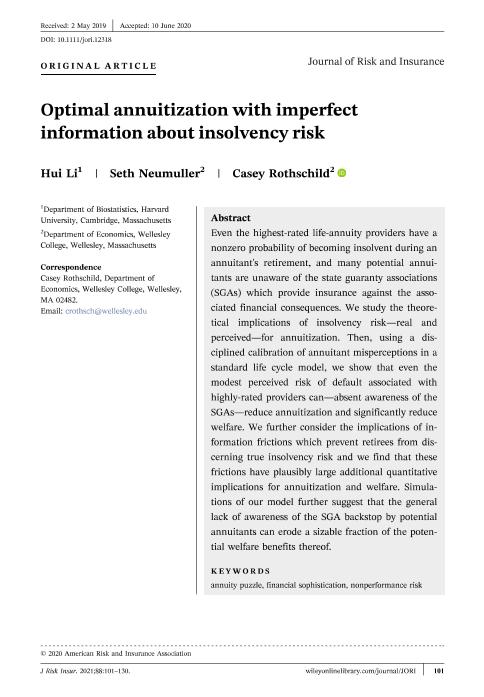Optimal annuitization with imperfect information about insolvency risk

Contenido multimedia no disponible por derechos de autor o por acceso restringido. Contacte con la institución para más información.
| Tag | 1 | 2 | Value |
|---|---|---|---|
| LDR | 00000cab a2200000 4500 | ||
| 001 | MAP20210005657 | ||
| 003 | MAP | ||
| 005 | 20210219144702.0 | ||
| 008 | 210219e20210301usa|||p |0|||b|eng d | ||
| 040 | $aMAP$bspa$dMAP | ||
| 084 | $a6 | ||
| 100 | $0MAPA20210003196$aLi, Hui | ||
| 245 | 1 | 0 | $aOptimal annuitization with imperfect information about insolvency risk$cHui Li, Seth Neumuller, Casey Rothschild |
| 520 | $aEven the highest-rated life-annuity providers have a nonzero probability of becoming insolvent during an annuitant's retirement, and many potential annuitants are unaware of the state guaranty associations (SGAs) which provide insurance against the associated financial consequences. We study the theoretical implications of insolvency riskreal and perceivedfor annuitization. Then, using a disciplined calibration of annuitant misperceptions in a standard life cycle model, we show that even the modest perceived risk of default associated with highly-rated providers canabsent awareness of the SGAsreduce annuitization and significantly reduce. We further consider the implications of information frictions which prevent retirees from discerning true insolvency risk and we find that these frictions have plausibly large additional quantitative implications for annuitization and welfare. Simulations of our model further suggest that the general lack of awareness of the SGA backstop by potential annuitants can erode a sizable fraction of the potential welfare benefits thereof. | ||
| 650 | 4 | $0MAPA20080558949$aInsolvencia | |
| 650 | 4 | $0MAPA20080573614$aRenta vitalicia | |
| 650 | 4 | $0MAPA20080554927$aJubilación | |
| 650 | 4 | $0MAPA20080552114$aPensiones | |
| 650 | 4 | $0MAPA20080611613$aModelos probabílisticos | |
| 700 | 1 | $0MAPA20210003257$aNeumuller, Seth | |
| 700 | $0MAPA20110019532$aRothschild, Casey | ||
| 773 | 0 | $wMAP20077000727$tThe Journal of risk and insurance$dNueva York : The American Risk and Insurance Association, 1964-$x0022-4367$g01/03/2021 Volumen 88 Número 1 - marzo 2021 , p. 101-130 |

